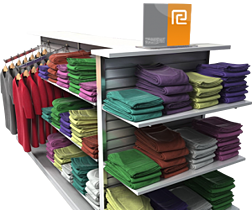A platform for brick and mortar retail
Brick and mortar shops will always be able to satisfy our senses better than web-shops. Add platform technology for inventory management and you will have a sustainable competitive advantage over e-commerce.
In the Netherlands, when we celebrate our birthdays, we serve a birthday cake. We usually buy a cake that everybody will like. Or we buy two, to cater for different tastes. Like an apple pie and a chocolate cake. And because we want to make sure everybody has enough, we always have left-overs. Most people like apple pie and chocolate cake. So, everybody politely eats their slice and sings Happy Birthday. You are happy, the baker is happy and so are your guests. But what if your guests prefer a sponge cake, a strawberry cake, or a blueberry muffin? Is that just bad luck? Maybe. Until tailored birthday cake-assortments become the norm. Where each guest can have their favorite slice. Not only would that make you a very popular host, but your guests will also eat more cake and the baker will sell more.
And that is already possible. By using data and platform technology.
Platforms match supply to demand
- Airbnb delivers exactly the right apartment on the other side of the world for your next holiday or business trip.
- Uber will take you to your destination, at exactly the time and with exactly the level of luxury you want.
- Spotify has exactly that song that you want to hear, right now.
- And Amazon offers exactly that edition of that book you have been looking for.
Platforms and economics
On a platform, the theory of supply and demand and the effect on price remains unchanged: when a product is scarce and demand is high, the price goes up. When supply is high and demands low, the price comes down.
The difference in platforms is that buyers and sellers know exactly what is on offer and what is in demand. The economic theory of ‘perfect information’ is no longer an assumption. It is a new reality, made possible by the exchange of data and accessible to everyone with an internet connection.
The difference in platforms is that buyers and sellers know exactly what is on offer and what is in demand. The economic theory of ‘perfect information’ is no longer an assumption. It is a new reality, made possible by the exchange of data and accessible to everyone with an internet connection.
Platforms and advertising
Before platforms, advertising was about creating reach and praying for conversion. Advertising media were dominated by magazines, newspapers, and TV, and billions of Euros were spent on shotgun advertising in the hope to get enough people interested and convert a high percentage of them into buyers. Highly-paid advertising executives like Don Draper in Mad Men got rich by knowing how to write the right copy; how to reach the most consumers and how to trigger many of them into buying.
Digitisation has made the shotgun approach to advertising redundant. Anyone can now reach almost everyone with a fraction of the media spend. Facebook, Amazon, and eBay understand this. Platforms make it possible to sell an ugly yellow ping pong table in Amsterdam to an eccentric individual in Salzburg without ever placing expensive adverts in multiple papers. A picture on eBay suffices. And it is free!
Digitisation has made the shotgun approach to advertising redundant. Anyone can now reach almost everyone with a fraction of the media spend. Facebook, Amazon, and eBay understand this. Platforms make it possible to sell an ugly yellow ping pong table in Amsterdam to an eccentric individual in Salzburg without ever placing expensive adverts in multiple papers. A picture on eBay suffices. And it is free!
Platforms for brands and retailers
Of course, digitization has not only brought good things to retailers. The shift to online has brought more competition, more choice, and margin pressure. In addition, increased retail fragmentation via shop-in-shops, franchises, and webshops has made the sales forecast less reliable, resulting in more markdowns and more lost sales. Not a happy story for brick and mortar retail.
But digitization can also be good for business. Especially when it is used to better match retail inventory to consumer demand. A platform approach to your supply chain will drive sales improvements through improved shelf-availability and reduce end-of-season discounts. On a platform, everybody wins the brand, the retailer, and the consumer. Too difficult? Too expensive? Or worth considering?
But digitization can also be good for business. Especially when it is used to better match retail inventory to consumer demand. A platform approach to your supply chain will drive sales improvements through improved shelf-availability and reduce end-of-season discounts. On a platform, everybody wins the brand, the retailer, and the consumer. Too difficult? Too expensive? Or worth considering?
Where Physical Retail has the edge
Brick and mortar stores will always have an edge over ecommerce. Many consumers will always want to satisfy their senses by feeling tasting, smelling, hearing and viewing the merchandise before they buy. Shopping has become an experience. Successful stores are looking good, smelling good and their service is improving.
From Supply chain to supply platform
But delivering a great experience is not enough. You will need to increase the control over your product flow if you want to get a return on your inventory.
At Retailisation, that is our business. With our software, we continually fine-tune the flow to the shelf to improve the match between supply and demand. We take the facts from the shelves and turn them into cash. We transform lost sales into sales opportunities and overstocks into: “this is your day; we have your size!”. Via a platform. And you don’t need to have a degree to use our App.
At Retailisation, that is our business. With our software, we continually fine-tune the flow to the shelf to improve the match between supply and demand. We take the facts from the shelves and turn them into cash. We transform lost sales into sales opportunities and overstocks into: “this is your day; we have your size!”. Via a platform. And you don’t need to have a degree to use our App.

The 80/20 principle
Retail stores typically generate eighty percent of their revenue with no more than twenty percent of their assortment. Since most stock-outs happen in this fast-moving part of the business, a small improvement in shelf-availability will have a big effect on sales.
With data and the right technology, Retailisation quickly identifies the fast movers and automatically sends orders or re-order levels to improve the match between supply and demand at retail. And the ROI of the retail network.
With data and the right technology, Retailisation quickly identifies the fast movers and automatically sends orders or re-order levels to improve the match between supply and demand at retail. And the ROI of the retail network.

On a platform, everybody wins
And everybody wins. Retailers sell more and do not have to mark down excessive redundant stocks, consumers are more likely to find their size and brands can introduce more profitable business models such as concession models or vendor managed inventory programs. Across any channel; clicks or bricks.
